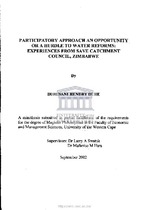| dc.contributor.advisor | Swatuk, Larry. A | |
| dc.contributor.advisor | Hara, Mafaniso M | |
| dc.contributor.author | Dube, Dumisani Hendry | |
| dc.date.accessioned | 2021-02-09T08:55:40Z | |
| dc.date.available | 2021-02-09T08:55:40Z | |
| dc.date.issued | 2002 | |
| dc.identifier.uri | http://hdl.handle.net/11394/7780 | |
| dc.description | Magister Philosophiae - MPhil | en_US |
| dc.description.abstract | For generations, participation has been a mainstay of academic writing and
teaching. By the 1970's, the policy statements of the major international donors
and implementing agencies all emphasize the importance of participation
(Dudley, 1993).
It is time to stop simply reiterating the cry for community participation and
prolonged argument about definitions of participation - related concepts. That
was yesterday's battle. Certainly, despite all the rhetoric, participation often does
not happen. | en_US |
| dc.language.iso | en | en_US |
| dc.publisher | University of the Western Cape | en_US |
| dc.subject | Zimbabwe | en_US |
| dc.subject | Water reforms | en_US |
| dc.subject | Integrated water resources management system | en_US |
| dc.subject | Gender inequalities | en_US |
| dc.title | Participatory approach an opportunity or a hurdle to water reforms: " Experiences from save catchment council, Zimbabwe | en_US |
| dc.rights.holder | University of the Western Cape | en_US |

